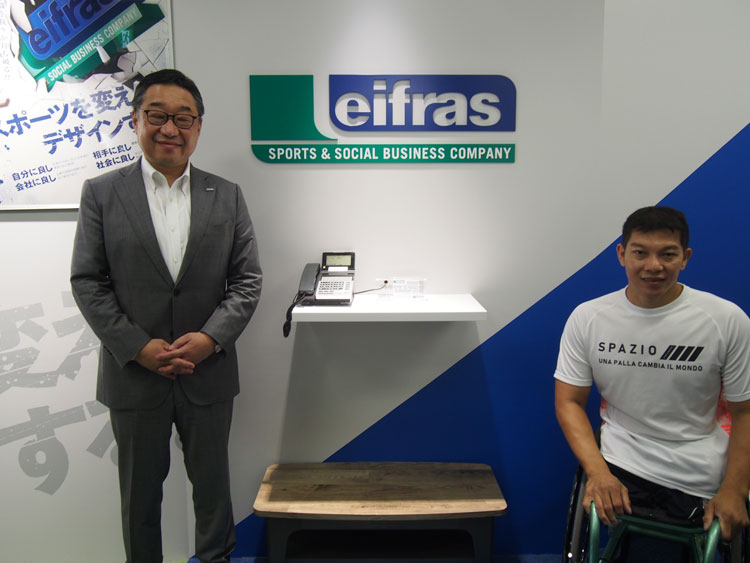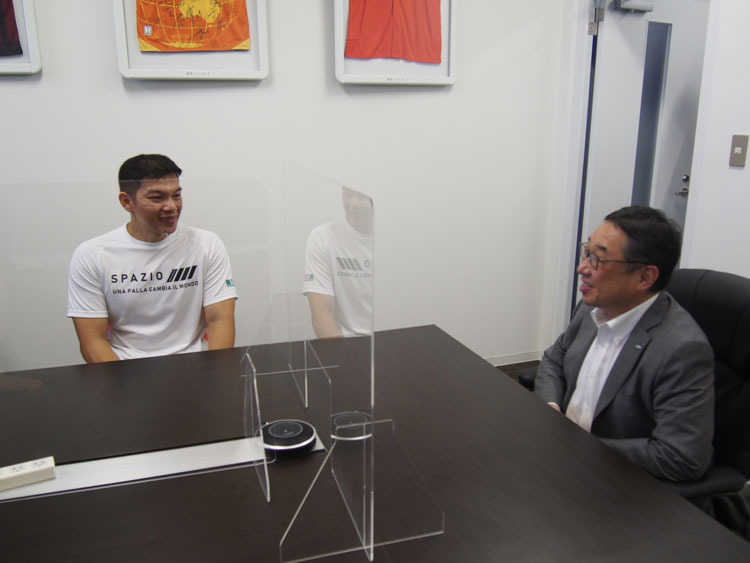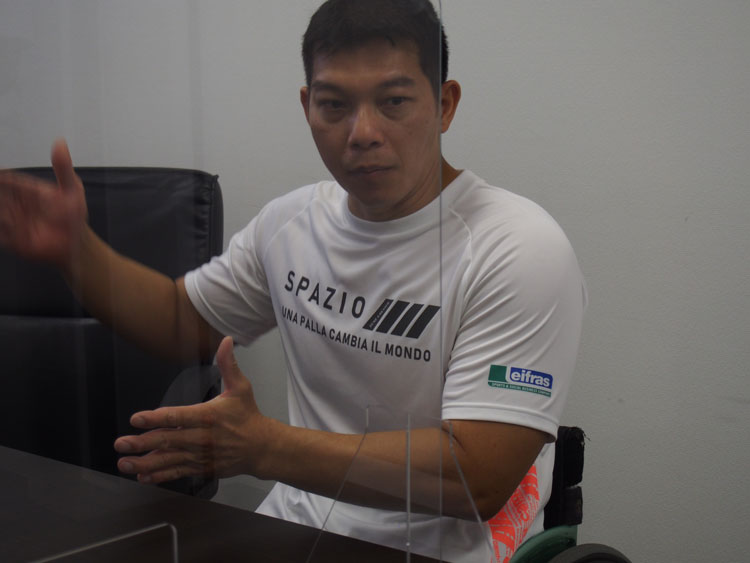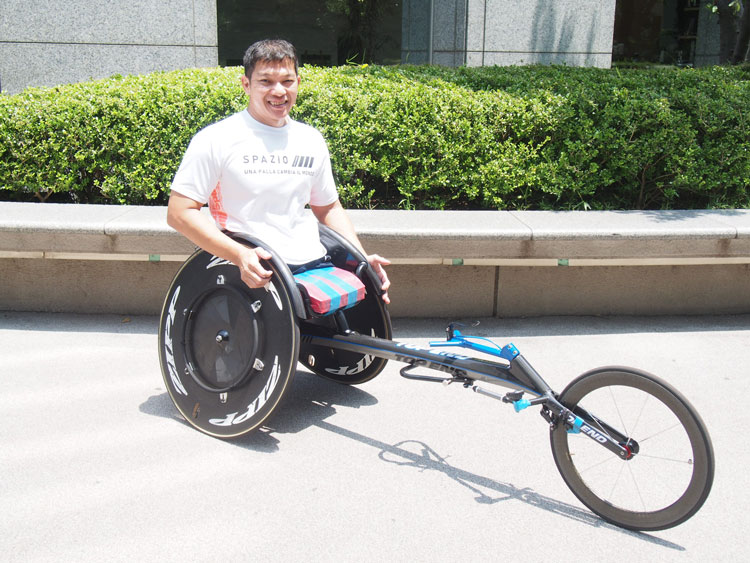-

-
- Wheelchair Racing Athlete
- Athens Paralympics Gold Medalist
Choke Yasuoka
PROFILE
Choke Yasuoka
Affiliation: Leifras Co., Ltd.
Date of Birth: January 18, 1973
Hometown: Prachuap Khiri Khan, Thailand
He was born without legs.
In 1988, while attending the Srisowan School for Special Education (junior high) in Bangkok, he discovered wheelchair racing and began participating in races within Thailand.
In 1990, he competed in the 10th Oita International Wheelchair Marathon, his first international competition.
In 1992, he represented Thailand at the Barcelona Paralympic Games.
In 1996, he was awarded a Thai royal honor for his achievements in sports, becoming the youngest recipient in history.
In 1996, he won the bronze medal in the 10,000m event at the Atlanta Paralympic Games and finished 5th in the marathon.
In 2003, through a special measure by the International Paralympic Committee, he was officially recognized as a member of the Japanese national team.
In 2004, representing Japan, he won gold in the 800m, silver in the 400m, and bronze in the 400m×4 relay at the Athens Paralympic Games.
Career Highlights
| 1992 | Competed in the Barcelona Paralympic Games |
|---|---|
| 1996 | Competed in the Atlanta Paralympic Games Bronze medal in the 10,000m event 5th place in the marathon event |
| 1999 | FESPIC Bangkok Games Gold medal in the 1,500m event Gold medal in the 10,000m event Silver medal in the marathon event |
| 2000 | Competed in the Sydney Paralympic Games |
| 2004 | Represented Japan at the Athens Paralympic Games Gold medal in the 800m event Silver medal in the 400m event Bronze medal in the 400m×4 relay event |
| 2006 | IPC Athletics World Championships Bronze medal in the 5,000m event |
| 2007 | 3rd place at the Seoul International Wheelchair Marathon |
| 2008 | Competed in the Beijing Paralympic Games 13th place in the marathon event |
| 2012 | Competed in the London Paralympic Games |
| 2014 | 2nd place at the Istanbul Marathon |
| 2015 | 1st place at the National Wheelchair Ekiden |

Public Speaking Activities
Theme: "Overcome—Moving Forward"
Born with a congenital lower limb deficiency, he grew up in an environment without access to a wheelchair, which made everyday life difficult.
He discovered wheelchair racing when he was a middle school student and learned the joy and fulfillment of striving for excellence.
Despite competing in the Athens Paralympics, he suffered an unexpected crash and fall during the race.
In this talk, he shares how he later went on to win a medal.
- Online lectures are also available.

or appearances
INTERVIEW
-
What led you to join Leifras, and what do you do in your current role?
I was invited by a Leifras employee at that time.
Although my previous workplace understood my involvement in sports, I had to train after completing my work.
At Leifras, I was told that my job was to engage in sports and inspire others through it, and I remember being moved by those words. 
-
What does wheelchair racing mean to you?
I was born without legs, but I didn't have a wheelchair until I finished elementary school.
I began using a wheelchair when I started middle school, and I began enjoying different sports and was captivated by the speed, which led me to begin competing.
In wheelchair racing, building your body is important, but other equipment, such as racing wheelchairs and the gloves used to propel them, can significantly affect speed.
We're always thinking about how we can go faster, and I think it's fascinating that we can pursue speed from a mechanical perspective as well.What is a phrase that's important to you and why?
"To overcome."
I think overcoming challenges requires perseverance to keep putting in the effort, step by step, not talent or luck.
No matter what unexpected, uncontrollable difficulties come your way, I believe that by staying focused and pushing toward your goal, you'll be able to overcome them.
Working hard even when outcomes are uncertain can be tough at times, but I try to take one step at a time, imagining what I'll be able to achieve once I've overcome that challenge. 
-
What is a memorable experience you've had during your past competitions?
This has to be the Athens 2004 Paralympic Games.
I worked through various challenging situations one by one and finally earned my spot on the Japanese national team. I focused on my training and went into the games in top form, but during the semifinals of the 1,500m, the event I had the best chance of winning, I collided with another athlete and fell.
I injured my shoulder, wrist, and face, and my racing wheelchair and wheels were damaged.
Still, I used a spare training wheelchair and wheels for the other events and won bronze in the 400m x 4 relay, silver in the 400m, and finally, gold in the 800m.
I consider it the moment I conquered myself.
At the following Oita International Wheelchair Marathon, I was cheered on by the crowd, as I was living in Oita at the time.
I wanted to win in style, but I had two flat tires during the race, and I finished in 90th place.
At one point, I thought about retiring, but there were people cheering me on no matter how far I went, and it reminded me how much fun racing was. 
-
What is your source of motivation?
I'm really not sure myself, but… I remember the exhilarating feeling when I'm able to race fast, and I think it's the desire to experience it again that keeps me going.
What is your biggest goal at the moment?
I want to make a comeback at the Paris 2024 Paralympics. Wheelchair athletes have long careers, and there have been medalists in their 50s in the past.
I want to work hard again.Could you share a final message?
Since I was born without legs, when I said I wanted to leave home and go to school, or when I said I wanted to be a professional sports athlete, or when I said I wanted to keep competing while working in Japan, many people told me these were unrealistic, impossible dreams. But at the same time, many people supported me and helped me make them a reality.
Not giving up on your dream is important. I want to share my experiences with others and support those who continue to work toward their extraordinary dreams. 